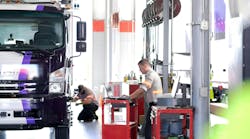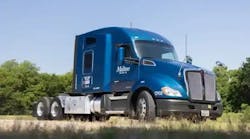The era of cheap fuel is ending. I first heard that prediction in 1973 when the country lined up for gasoline in what was generally called “The Energy Crisis.” It's taken 33 years, but it looks like sustained high petroleum prices are finally here for the foreseeable future. As a country and a society, we've nibbled around the edges of this long anticipated problem for the last three decades, but we really haven't taken any major steps to address it. Now we no longer have the luxury of time.
I'll leave the big economic implications to the general business media. Our focus is trucking, which certainly has a major stake in the issue since fuel is the largest operational cost for any fleet after labor.
At first glance, for-hire fleets seem somewhat insulated from high diesel prices since they all recover most of the recent increases with fuel surcharges. But look a little deeper. Shippers may accept growing fuel surcharges, but they're not likely to welcome rate increases on top of those bigger surcharges. In other words, money collected for higher fuel costs is money not available for higher service revenues.
Also, most carriers say they recover about 80% of fuel cost increases through surcharges. While the remaining 20% might not seem like too much, there's a big difference in actual dollars when you're paying $3/gal. instead of $2. And deadhead miles don't generate any revenue, no less a fuel surcharge, but they still burn diesel.
Of course, private fleets don't even have the illusion of a cushion as they run up against today's fuel prices. Every additional cent is a highly visible increase in the cost of running trucks to support the company's core businesses.
What can you do? After all, petroleum costs are being driven by global factors outside of your control.
Conservation is the first step, the one we've done our best to avoid as a country and as individuals. In trucking, that means fleet fuel economy has to become a priority.
Despite the seductive claims of some, there's no magic potion that delivers big fuel economy progress in a single jump. Instead, you have to manage your fleet to take advantage of every little fuel economy savings you can find. As many fleets discovered in the late 1970s and then forgot once fuel prices got cheap again, it will be a journey of many little steps. Equipment specs, driver training, maintenance, routing, storage, even customers have to be managed to conserve fuel.
Other than burning as little fuel as possible, the only other variable under your direct control is paying as little as possible for the fuel that you do burn. Again, there's no simple solution here. You need to learn about all the strategies open to you for purchasing fuel in bulk and on the road. Fuel optimization software and online services are a good place, but they're only effective when they're part of an overall fuel management approach.
Whether it's more efficient diesel engines, new types of hybrid power or viable alternative fuels, technology should eventually help trucking deal with the new reality of high petroleum prices. But we've wasted over 30 years already, and you can't afford to wait any longer for technology to save you.
E-mail: [email protected]
Web site: fleetowner.com


